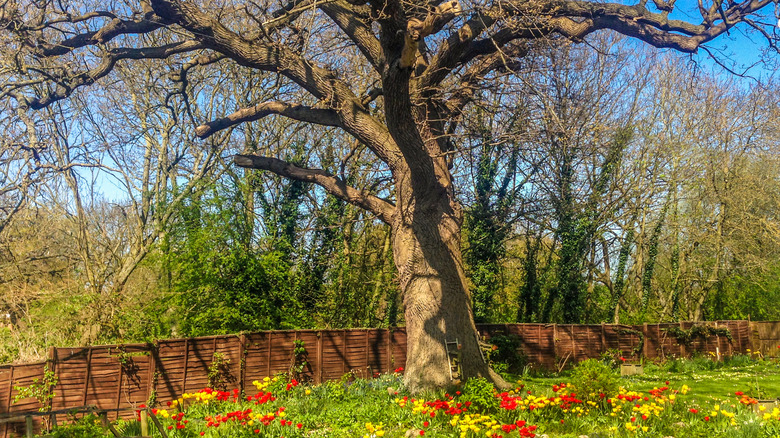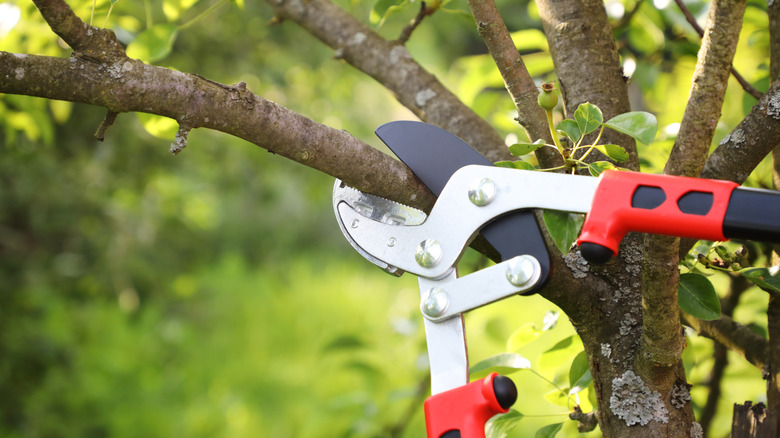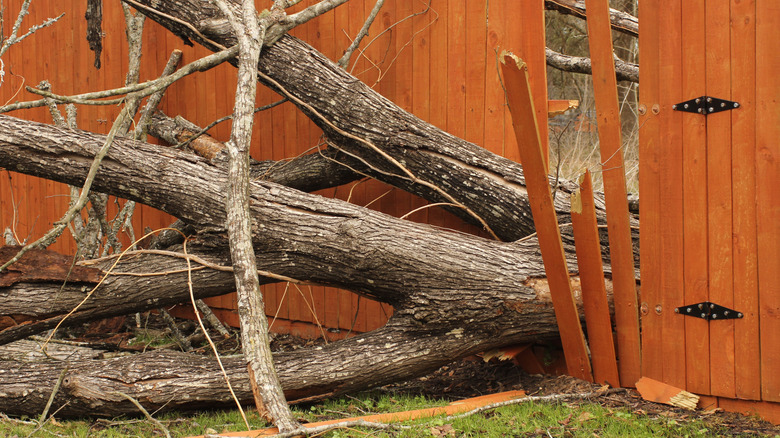Can Neighbors Legally Trim Trees On Property Lines? Here's What We Found
We all love big, leafy trees in the neighborhood, since they can provide well-needed shade and homes for our favorite songbirds. But sometimes trees on property lines can be the focus of pretty heated disputes between neighbors that can even wind up in court. Before you set off a legal war, let's go over some basic rights you have when it comes to trees at your property line. Yes, you do have the right to trim branches that grow over the fence and into your yard as long as your actions don't permanently damage the tree. You can ask your neighbor to trim them as well.
First, let's talk about these property line or boundary trees: What they are, who is responsible for their care, and who's liable if they damage property. Trees that grow along those property lines can be confusing for many homeowners. Boundary trees are typically trees where the trunk straddles line between you and your neighbor's property. Ownership of the tree is usually shared by both property owners, so both owners must agree on its care and both owners are responsible for its upkeep.
If a tree has its trunk located solely on one side of a property, but branches or roots extend across into another yard, then that tree is usually owned by the owner of the property where its trunk is located. To determine for sure who owns the tree or to understand the specific laws in your area governing tree trimming and maintenance, check with your local municipality.
In most cases, you can trim tree branches that extend over your lawn
Most of the time, if the trunk lies in your neighbor's yard, it's technically your neighbor's responsibility to care for the tree. But you and your neighbor might have different ideas about what that care looks like. Overhanging branches across your fence might bother you, but don't bother your neighbor. And while you know one of the advantages of cutting trees regularly is to help keep weak or dead branches from becoming a hazard, your neighbor might not care.
What's your neighbor's liability? Well, most tree owners are not liable for fallen branches due to acts of nature, like bad storms. If your neighbor's tree falls on your house or fence, then you'll need to file an insurance claim. That said, there are exceptions to this, like say, if you've been complaining for a long time to your neighbor about a diseased tree and your neighbor did nothing about it. This may cause you — or your neighbor — to consider that the best time to remove dead branches from pine trees might be now, so that you avoid any property damage from falling limbs.
You do have the right to trim tree branches that extend over into your property in most states. But only trim the branch right to the property line, and not any further. You just don't have the right to cut down a tree in your neighbor's yard or damage it. If you do, you might owe your neighbor compensation.
Communicate with your neighbor to avoid disputes
If you do have a tree overgrowing a property line, the best strategy might be to keep lines of communication open with your neighbor to avoid a potentially dangerous situation, like a tree falling through a fence. You do have the right in most places to keep your side of the properly line — both above and below ground — the way you want it. Spreading roots across property lines can cause damage to your fence or even your sewer pipes. You can trim these roots, just as long as the work you do doesn't seriously damage the tree that belongs to the neighbor.
Also, if you do trim roots or branches on your side of the property line, you can't toss the refuse into your neighbor's yard. That's illegal. If you feel the neighbor should be doing the trimming, know that in some states, you can sue your neighbor if they do not keep trees properly trimmed. Legal action should be the last resort since it can be an expensive proposition. It might be best to avoid planting trees anywhere near the property line just to head off potential disputes.
Before you cut down any offending trees at a neighbor's request, know that there are problems caused by removing trees – which can include damage to landscaping or property surrounding the tree if it's not done properly. You might want to consider hiring a professional arborist or call a tree service just to be safe.


